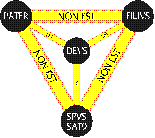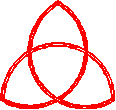The most obvious possible solution is to propose there are three distinct gods. This idea is the position of the Church of Jesus Christ of Latter Day Saints (i.e.. Mormonism).

Books and eBooks by the Director
The Relationship of the Father, the Son, and the Holy Spirit
The article Is Jesus God? demonstrates the Deity of Jesus Christ. The article Who or What is the Holy Spirit? shows the Deity and personality of the Holy Spirit. The Godhead of the Father is generally beyond dispute (see Isa 63:16, 64:8; Phil 2:11; Jude 1).
But how can the Father, the Son, and the Holy Spirit all be God? This question has baffled many. Three different solutions have been proposed to solve this problem. The following article is a critique of each one.
Three Persons; Three Gods
Mormonism:
The most obvious possible solution is to propose there
are three distinct gods. This idea is the position of the Church
of Jesus Christ of Latter Day Saints (i.e.. Mormonism).
Joseph Smith (the founder of Mormonism) proclaimed:
I have always declared God to be a distinct personage, Jesus Christ a separate personage from God the Father, and the Holy Ghost was a distinct personage and a Spirit: and these three constitute three distinct personages and three Gods (quoted in Ludlow, p. 273).
Joseph F. Smith (the sixth president of the Mormon church) explains that these three gods, ". . . are one in knowledge, in truth, in wisdom, in understanding, and in purpose." He further states, ". . . God is real, a person of flesh and bones, the same as you are and I am. Christ is the same, but the Holy Ghost is a person of Spirit" (quoted in Ludlow, p. 274).
Thus for Mormons, the Father, Son, and Holy Spirit are three distinct gods. They are also finite. Each ". . . person cannot be in more than one place at any time . . . . they are of limited extension in space" (Talmage, p. 43; see the articles listed under subject The Nature of God and The Trinity for more on the above concepts).
Even more gods?
This position raises an important question--if there
are three gods, why not more than three? In fact, the Mormon
church is not only tritheistic (belief in three gods) but
extremely polytheistic (belief in many gods).
Lorenzo Snow (fifth president) proclaimed, "As man is, our God once was; As now God is, so man may become (quoted in Ludlow, p. 72).
For the Mormon, God the Father "was once a man like us." And he "dwelt on a earth." By keeping the ordinances and laws of the Mormon gospel, he "became a God." Further, "We can become Gods like our heavenly Father" (Gospel, pp. 289-293).
In addition, Joseph Fielding Smith (tenth president) declared, "The Prophet (i.e.. Joseph Smith) taught that our Father had a Father and so on" (Smith, p. 12).
So according to Mormonism, through eternity past, gods have been creating planets. They populate them through sexual intercourse with their goddess wives; then some of their "spirit children" become gods themselves. And throughout eternity future, the same process will continue "worlds without end" (Brigham Young, second president; quoted in Ludlow, pp. 72-77).
With all these gods running around, can anyone really be sure that through eternity they will always remain "one in purpose." Could not someday "celestial warfare" break out between the gods? And if it does, how could you know if the god you are currently serving would be one of the winners?
The LORD is one!
More important than these logical problems with
polytheism is the testimony of the Scriptures. There are
literally hundreds of passages in the Bible teaching there is
only one God.
Jews have repeated the Shema for 3400 years. "Hear O Israel: The LORD our God, the LORD is one!" (Deut 6:4; note: Shema is the imperative form of the Hebrew word for "hear"). King David proclaimed, "You are great, O Lord GOD, For there is none like You, nor is there any God besides you" (1Sam 7:22).
As for the idea of men being exalted to Godhood, God Himself declares, "Before Me there was no God formed, Nor shall there be after Me" (Isa 43:10 see also 44:6, 8; 45:5f, 14, 18, 21, 23; 46:5, 9; Neh 9:6; 1Sam 2:2; 1Kings 8:60).
This monotheism is repeated in the New Testament. Jesus spoke of "the only true God" (John 17:3, 5:44). Paul declared, "There is only one God . . ." (1Tim 2:5 see also 2:17; 6:15; 1Cor 8:4-6 and other passages in both Testaments too numerous to list).
So there are logical and Biblical difficulties with tritheism and polytheism. But a new question now needs answered. How can the Father, Son, and Holy Spirit all be God if there is only one God?
One Person; One God
United Pentecostal Church:
The United Pentecostal Church (UPC, founded in 1945)
has revived an ancient concept in trying to answer this question.
In the early centuries the idea was called "modalism."
The UPC refers to it as "oneness."
Basically, the UPC believes, "God the Father and Holy Spirit are merely manifestations of Christ. In light of that conviction, converts are baptized only in the name of Jesus." Hence, they are known as "Jesus Only Pentecostals" (Tucker, pp. 384F).
In other words, the Father, Son, and Holy Spirit are just three different "modes" Jesus operates in. An illustration might help.
Let's say "Bill" has a father who is still living. He is married and has a five-year old son. Bill has three different roles to play. There is Bill the son, Bill the husband, and Bill the father. When Bill is operating in the mode of son, he acts differently than when he is functioning as Bill the husband. Bill the husband does not treat his wife the same way as Bill the father treats his son. Thus, son, husband, and father are three roles Bill plays. But there is still only the one person--Bill.
By comparison, Jesus sometimes functions as a Father when He gives laws and directions to us. He acts as a Son when He serves us (such as when He went to the cross). Jesus is the Holy Spirit when He indwells and empowers the believer. But Jesus is still only one Person. He simply plays different roles.
This "solution" may sound easy and pretty straight-forward, but there are major problems with it.
Can this God be Love?
C. S. Lewis brings out the first major problem with
modalism.
He writes:
All sorts of people are fond of repeating the Christian statement that 'God is love.' But they seem not to notice that the words 'God is love' have no meaning unless God contains at least two Persons. Love is something that one person has for another person. If God was a single person, then before the world was made, He was not love (Lewis, p. 151).
Let's go back to the "Bill" illustration. Bill the son never speaks to Bill the husband (hopefully!). Bill the husband doesn't communicate with Bill the son. Bill the father cannot love Bill the son. In the same way, if the Father, Son, and Holy Spirit are just three different roles Jesus plays, there can be no love or communication within the Godhead now or throughout eternity past.
Francis Schaeffer elaborates further on this problem with modalism. "If this were so, we would have a God who needed to create in order to love and communicate. In such a case, God would have needed the universe as much as the universe needed God" (Schaeffer, p. 289).
However, Paul declared that God does not need anything (Acts 17:25; Note: This line of reasoning would also apply to the type of monotheism promoted by Jehovah's Witnesses and Muslims).
Distinct Persons:
The most crushing blow to "oneness" theology
is the Bible. It clearly portrays the Father, Son, and Holy
Spirit as being distinct from each other. The Gospel of John is
especially damaging to the "Jesus Only" view.
The Gospel opens with the phrase "the Word was with God" (1:1). God gives the Son and sends Him into the world (3:16f). Jesus proclaims, "the Father loves the Son" (5:20). Jesus seeks to do not His own will but the will of the Father (5:30). The Father draws people to the Son (6:44). Jesus is the only One who has seen the Father (6:46).
Jewish law requires two witnesses to establish a matter (Deut 19:15). Jesus presents Himself and the Father as two witnesses. At the tomb of Lazarus, Jesus prays, "Father, I thank you that You have heard Me. And I know that You always hear Me . . ." (11:14f).
As the Passover was arriving, Jesus knew "His hour had come that He should depart from this world to the Father" (13:1). While preparing His disciples for His departure, Jesus promised to send "another Helper" (14:16 cf. 1John 2:1). The Holy Spirit will testify of Jesus and glorify Him (14:26; 16:14).
Jesus starts His High Priestly prayer by saying, "Father, the hour has come. Glorify Your Son that Your Son also may glorify You" (17:1). And further, He states, ". . . for You loved me before the foundation of the world" (17:24).
After his resurrection, Jesus tells Mary, "I am ascending to My Father . . ." (20:17). He tells His disciples, "As the Father has sent Me, I also send you" (20:21).
Passages such as these could be multiplied from all parts of the Bible (see for example Gen 1:26f; 11:7; Isa 6:8; 48:16; Acts 2:36; 4:27f; Rom 1:7; Phil 2:5-11; I John 4:9f; Rev 1:1; 5:13). The evidence is overwhelming, the Father, Son, and Holy Spirit are three distinct Persons; but there is only one God!
Three Persons; One God
Review:
 Before proceeding, a review should prove helpful.
First, it is demonstrated elsewhere that the Father is God, the
Son is God, and the Holy Spirit is a Person who is God. Second,
the first section of this article established there is only one
God. It was just shown that the Father, Son, and Holy Spirit are
distinct Persons from each other.
Before proceeding, a review should prove helpful.
First, it is demonstrated elsewhere that the Father is God, the
Son is God, and the Holy Spirit is a Person who is God. Second,
the first section of this article established there is only one
God. It was just shown that the Father, Son, and Holy Spirit are
distinct Persons from each other.
Also, tritheism was seen to be inadequate since it ignores the unity of God. Modalism emphasizes the "oneness" of God but at the expense of His diversity. So we now move to the third proposal to account for the three in one nature of God.
The early Christians:
C. S. Lewis describes the experience of the early
Christians in reference to this confusing situation, "People
already knew about God in a vague way. Then came a man who
claimed to be God; and yet he was not the sort of man you could
dismiss as a lunatic. He made them believe Him. They met Him
again after they had seen Him killed. And then, after they had
been formed into a little society or community, they found God
somehow inside them as well: directing them, making them able to
do things they could not do before. And when they worked it all
out they had found they had arrived at the Christian definition
of the three- personal God" (Lewis, p. 143).
The three-personal God! Somehow within the one God there
exists three distinct Persons (Matt 28:19). Tertullian (c.
155-220) coined the term "Trinity" to describe this
early Christian belief that God is a "tri-unity"
(Kroeger, p. 1079).
The logo on the left appears on the cover of most editions of The New King James Version of the Bible. Inside, its significance is explained, "The triquetra (from a Latin word meaning "three-cornered") is an ancient symbol for the Trinity. It comprises three interwoven arcs, distinct yet equal and inseparable, symbolizing that the Father, Son, and Holy Spirit are three distinct yet equal Persons and indivisibly one God" (NKJV p. ii).
This concept may be difficult to grasp. But then, we shouldn't expect to be able to fully understand the infinite God with our finite minds. We can only stand in awe of Him (Ps 33:8; 145:3; Rom 11:33-36).
This God is love:
During the discussion of modalism it was explained that for
love to exist there must be at least two persons. With the
Trinity, we have ". . . three Persons in existence, loving
each other, and in communication with each other, before all else
was" (Schaeffer, p. 289).
Schaeffer further writes, ". . . God did not need to create; God does not need the universe as it needs Him. Why? Because we have a full and true Trinity. The Persons of the Trinity communicated with each other and loved each other before the creation of the world" (Schaeffer, p. 289).
We need love:
God created human beings in His image (Gen 1:26f).
This image includes the inherent need to love and be loved. Being
tri- personal, God can look within Himself to find perfect love.
But we need to look outward. This need for love is partly
satisfied as we love one another (John 15:12). But ultimately, a
relationship with the Triune God is needed (John 17:3; 2Cor
13:14; Rom 8:9-11; 1John 4:12-16; 5:10-13).
Bibliography:
Note: All Scripture references are from The New King
James Version. Nashville: Thomas Nelson Publishers, 1985.
Gospel Principles. Salt Lake City: The Church of Jesus
Christ of Latter-day Saints, 1988.
Kroeger, R. C. "Tertullian." in Evangelical Dictionary of Theology. ed. Walter Elwell, 1078-9. Grand Rapids: Baker,1984.
Lewis, C. S. Mere Christianity. New York: Collier Books,
1952.
Ludlow, Daniel ed. Latter-Day Prophets Speak. USA:
Bookcraft, 1988.
Schaeffer, Francis. Complete Works of Francis Schaeffer. Vol. I. A
Christian View of Philosophy and Culture. Westchester, IL:
Crossway Books, 1982.
Smith, Joseph Fielding. Doctrines of Salvation. Vol. I.
Salt Lake City: Bookcraft, 1954.
Talmage, James. The Articles of Faith. Salt Lake City:
The Church of Jesus Christ of Latter-day Saints, 1987.
Tucker, Ruth A. Another Gospel. Grand Rapids, MI:
Academie Books, 1989.

RECOMMENDED READING ON THE HOLY SPIRIT AND THE TRINITY
Augustine. The Trinity.
Beisner, Cal. The Trinity.
Bickersteth, Edward. The Trinity. The Holy
Spirit.
Bowman, Robert. Why You Should Believe in the Trinity.
Clark, Gordon. The Trinity.
Graham, Billy. The Holy Spirit.
Lewis, C. S. Mere Christianity.
Lewis, Gordon and Bruce Demarest. Integrative Theology.
Magnani, Duane. The Watchtower Files.
Owen, John. The Holy Spirit.
Schaeffer, Francis. The Francis A. Schaeffer Trilogy..
Smith, Morton. God in Three Persons.
Sproul, R. C. The Mystery of the Holy Spirit.
Zeolla, Gary F. Scripture Workbook (three chapters on the Trinity).
The Relationship of the Father, the Son, and the Holy Spirit. Copyright © 1999 By Gary F. Zeolla of Darkness to Light ministry (www.zeolla.org/christian).
The above article originally appeared in Darkness to Light
newsletter in 1992.
It was posted on this Web site in July 1996.
![]() The Doctrine of the Trinity: The Basics
The Doctrine of the Trinity: The Basics
![]() The Doctrine of the Trinity
The Doctrine of the Trinity ![]() Mormonism
Mormonism
![]() Cults
and Aberrant Groups
Cults
and Aberrant Groups
![]() Text Search
Text Search ![]() Alphabetical List of
Pages
Alphabetical List of
Pages ![]() Subject Index
Subject Index
![]() General Information on Articles
General Information on Articles
![]() Contact Information
Contact Information
Darkness to Light Home Page
www.zeolla.org/christian